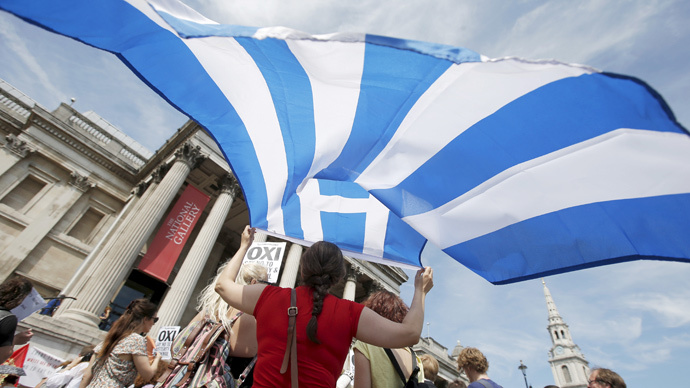‘Greece never received offer to make public debt sustainable’

Greece has been negotiating with its creditors for months, but it has never received a clear offer to reconstruct and make the public debt sustainable, says Costas Mavrides, MEP from the Democratic Party in Cyprus.
Greece has made an official request for a three-year bailout program from the European Stability Mechanism (ESM). No amount was mentioned but Athens does promise to immediately implement tax and pensions related measures.
RT:Greece has filed the paperwork for a third bailout. Who do you think will make the bigger concessions to keep the country in the euro - Athens or the creditors?
Costas Mavrides: I hope it’s going to be both sides. Actually that was my own initiative and my own pressure on both sides even [on Wednesday] during my intervention during the plenary session when the PM of Greece, Mr. Tsipras, as well as Mr. Juncker was there. My understanding is that mistakes have been made not only on the part of decades of corruption in Greece and misallocation of resources. But that’s the past. What we have now in front of us is that we have a new government with a fresh referendum and the result is very clear – the Greek people do not accept the demands of the creditors. The other new element, which basically indicates the position of the Greek government, is the fact that the IMF - traditionally not friendly to Greece organization - has basically made the case that the public debt of Greece is not sustainable. I’m asking everyone “Is there any leader who would accept for his own country an agreement without a sustainable debt?” Given those two arguments or elements I think Greece can make a case for an agreement, but at the same time, there are steps Greece has to make. I strongly believe that if PM Alexis Tsipras wants to remain in the eurozone, and that’s basically our goal as well as in the socialist and democratic political alliance here, then he has to come with some more concrete proposals and doing that he will have a lot of support, much more than has been shown [on Wednesday] at the plenary.
READ MORE: US & IMF call for Greek debt relief, warn of global economic damage if ‘Grexit’
RT:Mr. Tsipras met with quite a few boos and one of your German MEP colleagues said that “debt cut won’t hurt financial institutions and bankers, it’s going to be paid for by Spain and Portugal, it’s going to hit the nurses in Poland…” How fair is it that other countries suffering through austerity will be the ones footing the bill?
CM: To use the wording of Mr. Juncker, the President of the Commission, just [on Tuesday] he made the point that sometimes simple answers are not right and I think it applies to that case as well. [Such statements] is a political game, the surface might seem right although things are more complicated than that, and I will give and an argument for that. When a member state decides to submit itself in the eurozone, in essence that member state has given up a vital right which is the right to issue money… If we look at the case of the US, for example, a state there doesn’t have the right to issue money but at the same time it has automatically all the protection and support of the central government. We don’t have that in the eurozone, but at the same time we ask for solidarity. But what is solidarity in essence? Solidarity would be to provide help for Greece given that the issue now is not just an economic crisis, it’s a humanitarian issue and if we put more measures we are feeding the crisis more towards a vicious cycle. I understand the arguments of other member states, but at the same time we have to see the whole picture and not just simplify things in order to make our political point clear and to score points. We cannot say “we want a united Europe” and at the same time use divisive language. It’s as simple as this to me.
RT:If Greece does get part of its debt written off, won't other countries want the same treatment?
CM: I do understand that there is a point there that Greece has failed all the time and we do recognize that, but at the same time what is at stake it is not just Greece it’s whether we as Europeans we want to share the wealth, we want to see sustainable growth and I will give you an example of this. All these months, the last six months, we had intensive negotiations, but there was never a clear offer to Greece to reconstruct and make the public debt sustainable. Would anyone accept such an agreement without a sustainable debt for his own member state? Again, I understand that we have to balance the interests of different member states, but to say that a nurse or a clerk in Portugal would pay for the debts of Greece, I think that’s misleading and that’s oversimplification.

‘Much smaller eurozone than today in 10 years’
There is an increasing dichotomy of view today in Europe with Germans, Finns and Dutch exasperated with the Greek leadership and the French, Italians bending over backwards to keep Greece in the EU, says Keith Boyfield, economist and research fellow for the Centre for Policy Studies.
RT:We understand that debt relief remains part of the Greece plan. But the creditors have ruled that out before. Does Athens have any chance of getting some leeway on the amount of debt it's got to pay back?
Keith Boyfield: If you think about it in Ireland, Spain and Portugal people have been making huge sacrifices, so the question is why should the Greeks be given such special treatment and I think that you are beginning to see many political leaders getting increasingly exasperated with the Greek leadership and they might actually finally call it a day this weekend.
RT:EU governments maintain that a 'Grexit' is not an option for them. But on Tuesday the European Commission President Jean-Claude Juncker said “We have prepared a Grexit scenario in detail...” So which is it to be for them, do you think? Get a deal or cut Greece loose?
KB: They don’t want it to happen but they are not prepared to pay the club dues and I just can’t see how the public in Greece are going to be prepared to live with the austerity measures and the increases in tax. A lot of them basically are going to deter the tourist traffic which Greece depends on so much. We are heading for a big disaster if we kick the tin down the road a little further.
READ MORE: Grevolt? Voices supporting Athens grow in European Parliament
RT:Can Greece be part of the EU but leaves the eurozone?
KB: It can be part of the EU, but I think what we are increasingly seeing is a dichotomy of view. The Germans, the Finns and the Dutch are getting increasingly exasperated with the Greek leadership, but the French and Italians are bending over backwards to try and keep Greece in the EU and the French I notice have been talking to the US to try and provide diplomatic support for the Greeks to stay in Europe.
RT:Why are French and Italians staying in beyond the Greek side?
KB: Because I think what they all fear, particularly the north class in France, that if Greece leaves the euro you might see next time we have a financial crisis in Spain, Portugal or Italy. There will be tremendous pressure on those countries, the Club Med countries, to leave. I wouldn’t be surprised that if in ten years’ time we see a much smaller euro area than we do have today.
RT:What about Germany then?
KB: I’m beginning to feel that the general public and the political support of Mrs. Merkel in Germany are just fed up of the Greeks basically, and in Greece the public is just fed up of living within the austerity and the austerity demands of being within the euro. So quite a few of them I think would rather leave.
LISTEN MORE:
The statements, views and opinions expressed in this column are solely those of the author and do not necessarily represent those of RT.
The statements, views and opinions expressed in this column are solely those of the author and do not necessarily represent those of RT.












